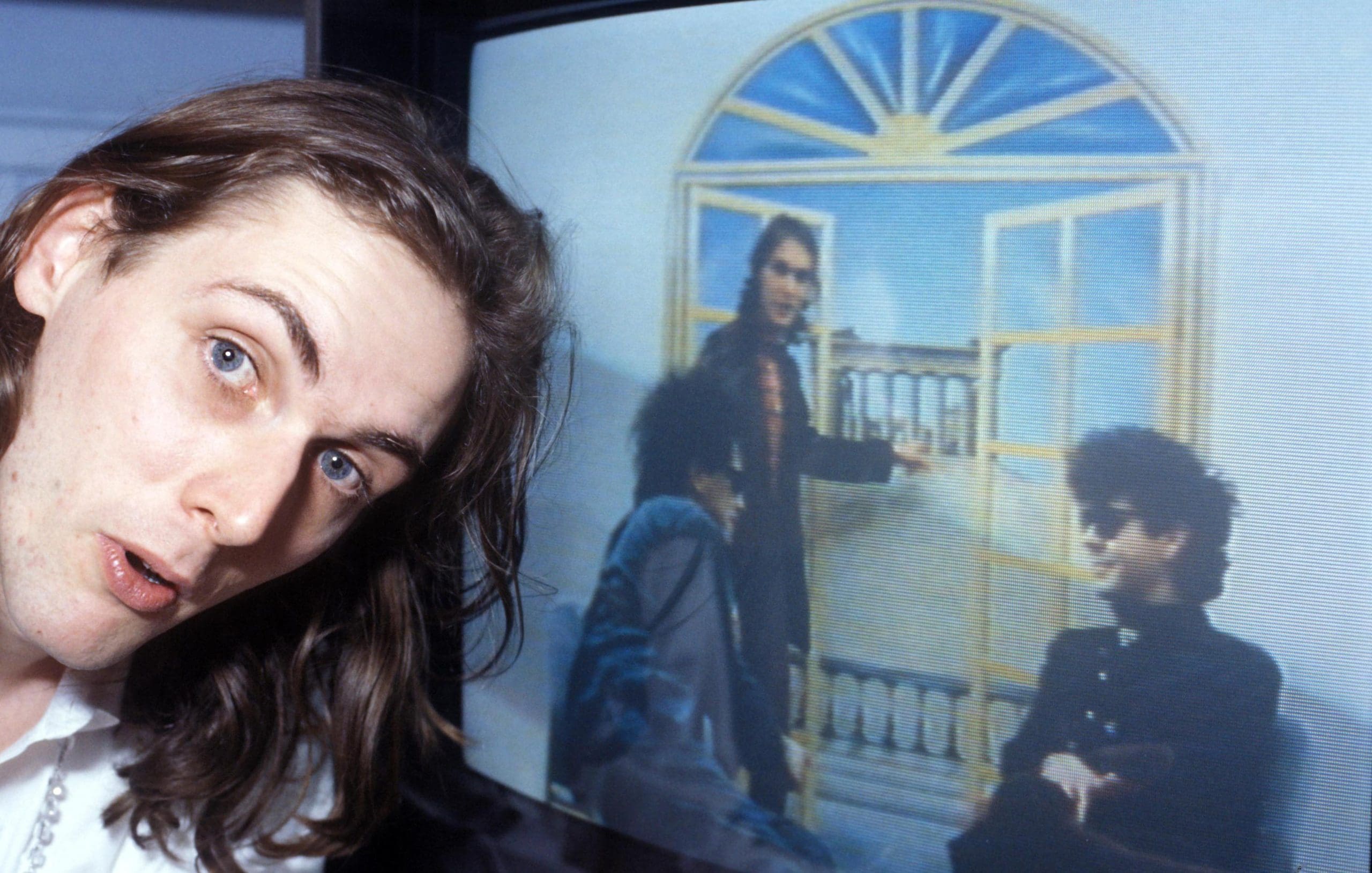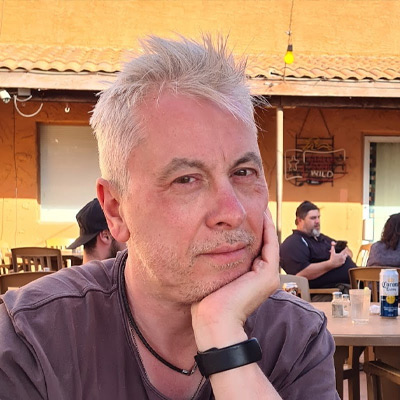With a landmark live show by The Cure about to hit DVD, we talk to its director, Tim Pope, about his work with the band and a whole host of other seminal acts. From Beatles covers to homoerotic Weller on a riverbank and S&M dwarfs, it’s a career full of surprises…

It was in 1982 that Tim Pope helmed his first Cure video – the promo for their ninth single, Let’s Go To Bed. Now 37 years later, he’s still by the band’s side, having recently masterminded the feature-length film of their momentous 40th anniversary concert in London’s Hyde Park on 29 May.
However, there’s so much more to Tim Pope than simply being the visual chronicler of the world’s favourite goth-pop chameleons. The list of videos he crafted during the 1980s is ridiculously, awe-inspiringly long. He was the go-to guy for virtually all of Soft Cell’s promos and the man Paul Weller called when he wanted to get The Style Council’s songs onto MTV. He also directed sizzlingly memorable promos for The The, Hall & Oates, David Bowie, Strawberry Switchblade, Men Without Hats, Talk Talk, Siouxsie And The Banshees and Altered Images, among many, many others.
Remember the video for Soft Cell’s Sex Dwarf, with its Soho brothel workers wielding chainsaws, a dwarf in a fetish outfit, heaps of raw meat and Marc Almond in a tiny codpiece? A Tim Pope production.
We spoke to Pope ahead of the release of the 29-song, 135-minute anniversary film The Cure – Anniversary 1978-2018 Live In Hyde Park London about his four-decade life behind the camera, his favourite videos and experiences working alongside some of the 80s’ most daringly original musical misfits.
You once said, “Even my dreams came with dirt on them, like my Standard-8 movies”? So how did you get into the film-making game?
I’d done the film college thing and ended up working for this company that trained politicians to go on telly. That was at the end of the 70s, so I used to go to 10 Downing Street. I know people do media stuff these days, but this was like the first company to do it. Then Labour and Mrs Thatcher got in, so I always think I’m partially to blame for that.
In the meantime, I used to nick the camera in the evening and go and film bands on stage. I was working with people like The Psychedelic Furs and The Specials, just filming them at gigs with a single camera. And then a mate of mine from the place where I used to nick the camera from had just done a video for Iggy Pop, so I started doing storyboards for videos. I think my first video was for Soft Cell’s Bedsitter.
A great song with which kick off your music video career…
I still think it’s an excellent video, but it is from a time when promos were actually shot on videotape. I think it touches on a lot of what’s good about my work. It’s kind of inside the music. I think, in those days, it was something quite far out. It was experimental and it had a single good idea, which I think videos should have, with the matching shirts and wallpaper, and the idea of Marc being absorbed like the L-shaped room.
You directed 14 of Soft Cell’s videos. What made that working relationship so fruitful?
My thing is always to get to know the bands well. I always use this metaphor of the tailor. In a way, all I try to do is create a suit which fits them perfectly, rather than an off-the-peg number. When I get a song, I take it in my mind, sort of chuck everything up into the air and see where it lands in my imagination. I take it from there. That’s to do with the lyrics, what the band have told me, their history… I mean, I can still remember the time I first pitched to Marc Almond. I do a lot of talks to film students these days and one of the things I say to them is, you will have the passion to do anything, you will kill, you will steal, you will do anything, to make your film. And I wasn’t going to let Marc leave that room until he said yes to me. I told loads of lies about videos I’d done, I think I claimed I’d worked with Suzi Quatro, and god knows who else… that seemed to impress him.
You don’t do many music videos these days. Is it a dying artform?
I think they had their moment. The last one I did that I liked was one for Fatboy Slim, for a song called Slash Dot Dash. I love that video because I shot that in six or seven hours and, at that point, I hadn’t made a video in years. The reason I decided to do it was born because, well, my hair had started to become a bit grayer and people suddenly began to give me lifetime awards. I remember the awards morphing in my hands into a carriage clock, like a retirement thing, and I just thought, ‘Oh my god, I’m not ready to retire!’ So I thought, ‘Fuck it, I’ll do this video’, and I did. I still think it’s got a great energy to it.
What do you think is different now about record companies and their attitude towards music videos?
My relationship with the bands was key and nowadays record companies come between you and the band. These days, record companies act more like advertising agencies. It doesn’t seem very relevant, someone like me doing videos. I think there are far better people doing the type of videos that are required.
You directed The Cure’s 1986 concert film, The Cure In Orange. And now, 33 years later, here you are again, directing their latest.
I’ve read some stuff on Twitter saying, ‘I don’t wanna see The Cure in daylight, they’re a night band,’ and they are, but they’ve also got these amazing, uplifting, sun-drenched songs as well. I think the shift from daylight to the evening was very important in terms of the film. That was the story I wanted to tell. Robert makes reference to that early on, he says something like, ‘Oh, the sun’s gone down.’ It was draining his energy before.
What I wanted to do was capture two things about the band. One was their epic music – I think there’s no one as epic as them. Also, the day before the show, I sat in the middle of the band while they rehearsed the entire set in this tiny room and I thought, what I want to do is capture their relationship, so I shot it, hopefully, like a piece of drama. You feel their musical relationship through it and that’s what I was after. I tried to film it from the point of view of it being in the best seat – the seat I had in rehearsal. How many thousands of Cure fans would have died to have had that place? So I wanted to make the film from that point of view.
To me, this film is like Orange II and I think it’s another turning point for them. We’re moving into their third act with this new album they’re about to finish. Robert has told me about it, I know it’s quite dark, I think that sounds very promising.
Was it always intended that this concert would be filmed?
As with all things Cure, Robert pinged me an email about three weeks before, saying, ‘Fancy filming us at Hyde Park?’ He wanted to film it on the basis that, if the show was good, we’d put it out. I think that my cameras happened to be there as they happened to play one of their best-ever sets. This set is utterly great.
We hear you’re planning a definitive documentary about the band…
We decided to announce it a year ago because a lot of people were talking about making documentaries about The Cure and Robert was getting fed up with it. The thing about Robert is that things happen in ‘Robert time’ – he’ll do it when he’s ready to do it. I would imagine we’ll start next year. The wonderful thing about it for the fans is that he’s going to give me about 50 boxes of unseen footage. I want to make it this kaleidoscopic view of their entire career. That’s my ambition. It will happen.
You directed The Crow: City Of Angels, in 1991, which was a pretty bruising experience. Would you ever consider going back to feature films?
I’m finally, finally ready to make a film again. I’m just casting a movie at the moment called Drone, which is something I’ve written myself. I hope to be shooting that in the new year, but you never know with movies. It’s definitely where I want to go. I’m ready to have something with my name on it and that’s my film. I have to do that before I die.
Steve O’Brien
Classic Pop may earn commission from the links on this page, but we only feature products we think you will enjoy.


